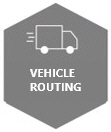Vehicle Routing Case Study

Description
Create a detailed transportation plan that provides the optimal multi-stop routes for existing shipments. The routes that are created consider the constraints of your hours of operation, warehousing, cross-docking and transportation assets.
Sample questions this use case addresses
How can I can analyze my historical shipments and identify opportunities to reduce transportation costs and increase efficiencies?
Where and when should I use 3PLs (third party logistics providers), LTL (less than truckload) shippers, or a private fleet?
Is my logistics service provider leaving value on the table?
How do I calculate the true cost-to-serve for individual customers on my routes?
Are my delivery zones optimally defined?
Do my delivery zones need to change due to my facility footprint?
Typical use case inputs
Historical or planned orders
Available assets
Asset configurations and constraints
Lanes capacities and costs
Shipment restrictions
Business hours and special asset needs for different customers
Supplier locations and windows for backhaul pickups
Typical use case outputs
Shipment consolidations
Fleet sizing plan
Transportation mode selection decisions
Periodic shipment balancing and scheduling
Continuous move (pickups & drop-offs) lanes
Hub (and spoke) strategy design
Transportation Optimization value
There are many routing tools that offer day-of-execution level routing, track and trace, and dispatch support. These tools assume a fixed or given network strategy and don’t help you explore how your network could perform in different configurations. The combination of end-to-end modeling, rich optimization algorithms and visualization techniques allow an organization to consider the impact of countless what-if scenarios in a simulated environment to identify plans to reduce costs while increase assets utilization and service levels.
Customization
Level Required: Medium
Details of Customization:
DDM
Medium level of customization required. Pending vehicle routing problem scope, customization may include data on available assets, asset configurations and constraints, lanes capacities and costs, shipment restrictions, business hours and special asset needs for different customers, supplier locations and windows for backhaul pickups.
Model Building
Medium level of customization required. Transportation Optimization AMB can be used as a good starting point. Pending on problem scope and details available, could incorporate details such as asset availability, additional costs and constraints, shipment restrictions, business hour and special asset needs for different customers, supplier locations, and windows for backhaul pickups.
Last modified: Friday May 12, 2023
